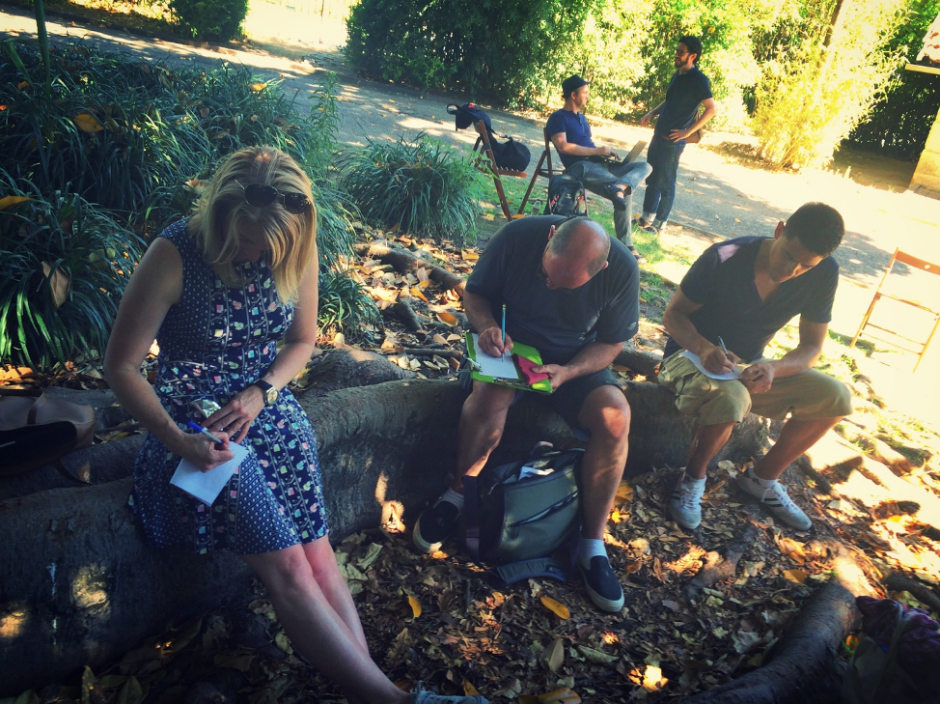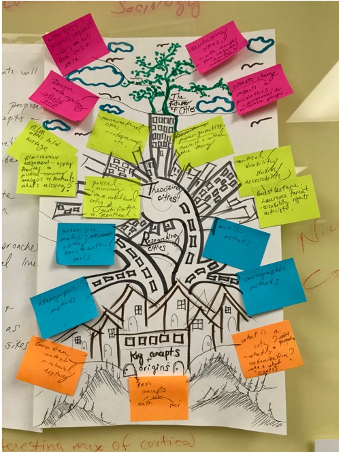2. Explore your topic
In addition to freewriting, an excellent way to explore a research topic is through brainstorming or mapping initial ideas. Students with more visual and tactile learning styles often find it helpful to sketch their research ideas to spur a more creative planning process. You may want to attend an Art Hive at Concordia to explore your ideas through mixed materials.
Once you have gathered your ideas, you can begin to select the main topics that you want to write about and organize them into a draft structure.
I find it helpful to make the planning process creative as well by drawing a concept map of the main themes I want to address. I then use post-it notes for sub-themes and references, which I can easily attach or move around as I write and discover new connections. I’ve attached a sample concept map of course syllabus that I designed.
3. Use available resources
Concordia’s Student Success Centre offers a number of useful online resources as well as one-on-one tutoring for both graduate and undergraduate students. Try to start with an appointment early in the semester to work through any of your writing or academic concerns rather than waiting for the day before your paper is due.
Some departments also have a writing tutor available on a drop-in basis — check with your department. You can also try this writing assignment calculator to plan each aspect of the writing process and to help allocate your time.
4. Try a writing technique
There are a number of books available on writing strategies. One of the best ways to explore these techniques is to join a writing group such as tais-toi et écris Montréal, where you can sit down with others to effectively “shut up and write.”
In my writing group, we use the Pomodoro Technique, a time-management strategy created by Francesco Cirillo. This strategy involves dividing writing time into roughly 25-minute intervals of uninterrupted work, each followed by a five-minute break. The reason the Pomodoro Technique is so effective is that it uses a principle called timeboxing, which involves setting aside a period to concentrate on one specific task.
Turning off your phone, text messages, emails and social media during writing times is key to avoid distractions and procrastination. This technique is incredibly useful for bringing a getter sense of flow and focus to the writing process. All you need is a timer to use this method, or you can try one of the many apps available.
5. Set realistic expectations
When working on a deadline, I also like to set a realistic page per day — or words per day — expectation for myself (even if it’s just one draft page per day), rather than trying to simply sit in front of the computer for a set amount of time. This process can be especially helpful for people who tend to excessively edit while writing.
The idea is to commit to completing the draft pages for the day, no matter how unpolished or raw they may be. If you finish the pages early, then you can use the rest of your time to continue writing, to start editing, or you could give yourself some well-deserved time off!
Setting realistic expectations also involves creating the right work-life balance with your time as well as finding ways to manage the stresses of writing, studying and tending to other responsibilities. See Heather Herriot’s blog post on ways to reduce stress. You can always carry a pocket notebook with you to quickly jot down any writing ideas that pop into your head when you are away from the computer.
6. Share your ideas
When people think about writing a thesis or dissertation, the image of a solitary graduate student writing alone for months or years on end often comes to mind. This image is not always inaccurate, as I have heard many graduate students say “don’t ask me about my bleeping thesis” in frustration with the writing process.
At some point, however, most of us realize that good writing involves a lot of discussion and engagement with different viewpoints. Scholars such as bell hooks describe critical thinking as an interactive process that requires active participation from students, teachers and the wider community.
Whenever possible, try to discuss what you are writing with your friends, family, roommates or coworkers. This process is useful for spurring new ideas, while helping to loosen up any academic jargon. You may also want to consider forming a peer-review group with your classmates.
Not only does sharing our ideas make academic knowledge more inclusive to a wider audience, but it is also key to helping us move past our stumbling blocks and reconsider writing as something engaging, imaginative and interactive.




